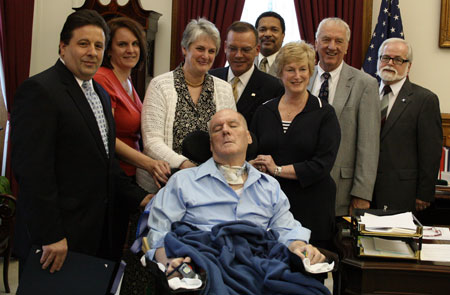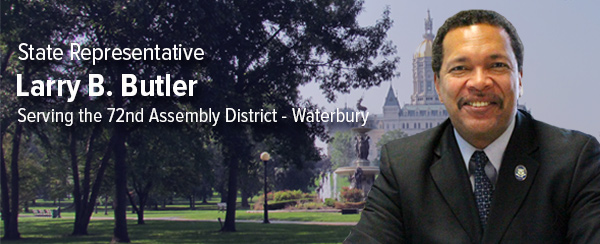

June 16, 2008
REP. BUTLER: GOV. RELL SIGNS
"MONEY FOLLOWS THE PERSON" LEGISLATION
State Representative Larry B. Butler (D-Waterbury) today announced the bill signing of Public Act 08-180: An Act Concerning the Money Follows the Person Project. Effective July 1, this new law will increase the number of individuals from 700 to 5,000 who can be served under the state's plan for participating in the federal Money Follows the Person (MFP) Demonstration program, which allows individuals to move of nursing homes and receive care in their own homes.
"I received many messages from constituents in my district on this," Rep. Butler said. "One in particular was speaking of her mother being in a nursing home and how it would be beneficial to have her at home, was the prevailing sentiment."
MFP is a five year program that permits states to move individuals out of nursing homes or other institutional settings and into less-restrictive, community-based settings. The Department of Social Services (DSS) has developed a protocol for the demonstration, which needs federal approval before it can be implemented.
After following the campaign of constituent Joe Stango to champion this bill, Rep. Butler said, "Joe gave me a call and we talked about MFP for a while and he made compelling reasons why I should support this bill. Also, after reading about Bob Veillette's health concerns, I knew this was a bill to fight for and support."
In 2005, Congress, as part of the Deficit Reduction Act, enacted the MFP provisions as a way to encourage states to rebalance their long-term care spending by moving individuals from nursing homes or other institutions into less-restrictive, community-based settings. The law requires that program participants reside in the nursing home for at least six months, and need a nursing home level of care once they leave.
States that run the demonstration projects are eligible for an enhanced federal match (75% instead of 50%) of state expenditures for the first year of Medicaid-eligible services. For some of these services, states must commit to providing them once the year is up through some other authority. Federal matching funds (50%) are also available to support services not allowed by Medicaid that the state will provide during the demonstration, such as housing coordinators.
Rep. Butler is serving his first term in the Connecticut General Assembly. He is a member of the Finance, Housing, and Human Services Committees.
